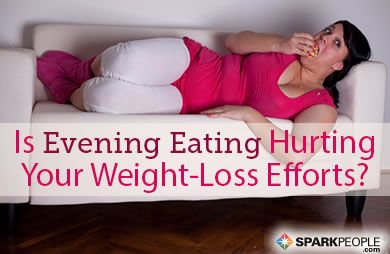Is Evening Eating Destroying Your Weight Loss Efforts?

Balanced breakfast? Check
Mid-morning snack? Check
Healthy lunch with your co-workers? Check
Passing up your friend's homemade cookies? Check
Coming home in the evening and going on a feeding frenzy? CHECK!!
Does this sound like the bulk of your days? You're in control, everything is going fine - until you come home starving at night and eat a large dinner, say yes to dessert (and seconds) and finish off a bag of chips before bed. What gives?
From a metabolic standpoint, there is really no reason not to eat food in the evening. A calorie is a calorie regardless of when it is consumed. A morning calorie is metabolized in basically the same way as an evening calorie. However, eating in the evening is a problem for many, not because of the way food is metabolized, but because of the quantity of food that is often eaten.
Skipping meals and becoming overly hungry by evening can lead to nighttime binge eating. Recent studies revealed that when people ate three meals a day only 13% binged. When people skipped breakfast, 24% binged and when people skipped breakfast and lunch, 60% binged. In general, people who spread their meals throughout the day seem to be better able to control their eating. They are less likely to feel hungry and less likely to overeat. So by eating breakfast, lunch, and dinner and planning snacks in between, you can help yourself lose weight as well as maintain better control of your eating throughout the day and night.
For most people, the evening is "down-time," used to relax, watch television, and unwind from the stresses of the day. Others view this as a time to multi-task and catch up on household chores, bills, homework, and other responsibilities. Whether you're winding down or checking off your to-do list, unconscious eating can accompany your routine and result in a massive calorie intake. Devouring a bag of chips, a sleeve of cookies, or a pint of ice cream can occur when your mind is somewhere else.
The Role of Sleep
Consuming a large amount of food before bedtime can also result in indigestion and sleep problems, which can trigger you to eat more during the proceeding days. A growing body of research suggests a connection between obesity and lack of adequate sleep. Statistics show that overweight individuals sleep about 1.8 hours less a week than people of normal weight. Since the 1960's sleep duration for American adults has dropped by as much as two hours a night, while obesity has drastically increased.
Sleep is a regulator of two hormones that effect appetite, leptin and ghrelin. Leptin helps suppress food intake and stimulate energy expenditure, while ghrelin stimulates appetite, fat production, and body growth. When one is sleep deprived, the level of leptin drops and the level of ghrelin increases. The result is a drastic increase in hunger. One study reported a 24% increase in hunger, with excessive, uncontrollable cravings for calorie and carbohydrate packed foods such as cookies, candy and cake. It can all add up to a vicious cycle of late night binges, lack of adequate sleep, uncontrolled snacking, late night binges, and so on.
Are You An Evening Eater? Try this exercise to find out.
Use the Nutrition Tracker to track 3-5 typical days of eating. Print each day's results and use your records to answer the following questions:
1. How many meals and snacks did you eat after 5:00 pm?
2. How many meals and snacks did you eat during the day?
3. How many total calories did you consume after 5:00 pm?
4. How many total calories did you consume for the day?
5. What activities occurred while you ate after 5:00 pm?
You may have a problem with evening eating if:
- More than one-third of your meals & snacks are eaten after 5:00 pm.
- More than one-third of your total calories are consumed after 5:00 pm
-
Evening eating constantly occurs with another activity.
Put An End to the Evening Binge Cycle!
You CAN control evening eating disasters. Try these tips to normalize sleeping patterns and fend off hunger:-
Plan activities to do throughout the evening, but don't make food a part of the activity:
- Take a bath
- Walk the dog
- Pay bills; balance the checkbook
- Play board games with the kids
- Call a friend
- Keep your hands busy (polish the silver, sew, knit, or do any craft)
- Play basketball, baseball, soccer
- Read a book or magazine
- Try a relaxing fitness video such as yoga or tai chi.
- Eat 3 meals daily and 1-2 planned snacks, keeping in mind your total calorie range.
- Plan to eat about the same number of calories at each meal throughout the day. The total should be within your calorie range.
- Have a low-calorie beverage (diet soda, flavored water, etc.) in the evening.
- Make a list of low-calorie snack options. Select one for the evening. Eat it, but no more.
- Don't eat mindlessly! Eat all meals and snacks at the kitchen table, keeping all of your attention on the food you're enjoying. Take your time and really enjoy every bite.
- Get 7-8 hours of sleep nightly.
- Maintain a regular bed and wake time schedule, even on the weekend.
- Establish a regular, relaxing bedtime routine.
- If you have trouble sleeping, leave the bed (or room) and pursue another activity like reading until you're ready to sleep. Use your bedroom only for sleep and sex.
- Finish eating at least two to three hours before your regular bedtime.
- Exercise regularly.
- Avoid caffeine and alcohol close to bedtime; avoid nicotine altogether.
-
Plan activities to do throughout the evening, but don't make food a part of the activity:
-
The Art Of Snacking To Lose Weight
Control that sweet tooth. Remember that sweet things generally mean mo
-
The Every Other Day Diet Review
Getting rid of fat can be so challenging
-
Weight Loss Is Possible Even In Remote Places
Something about winter encourages people to think about things that wi
-
Does Your Actual Stomach Size Change With Your Eating Habits?
Making changes in your l
-
Natural Weight Loss To Maintaining A Healthy Lifestyle
Maintaining a healthy weight isn’t a special secret, in fact nat
-
Why Dieting Doesnt Work
What do you do when you realize you need
- DON'T MISS
- Weight Loss Portion Control Out Of Control
- Could A Gluten-Free Diet Be Doing You More Harm Than Good?
- Tips On How To Get Thinner Thighs
- 5 Tips to Prevent Holiday Weight Gain
- 4 Things You Must Master For Real Weight Loss
- Acupuncture & Weight Loss: There's more to it than counting calories!
- How To Get Your Best Body & Feel Great Effortlessly
- Use Water To Wash Away Your Body Fat
- How Long Will One Be Out Of Work After Having Lap Band Surgery?
- Is Pain Stopping You From Losing Weight




